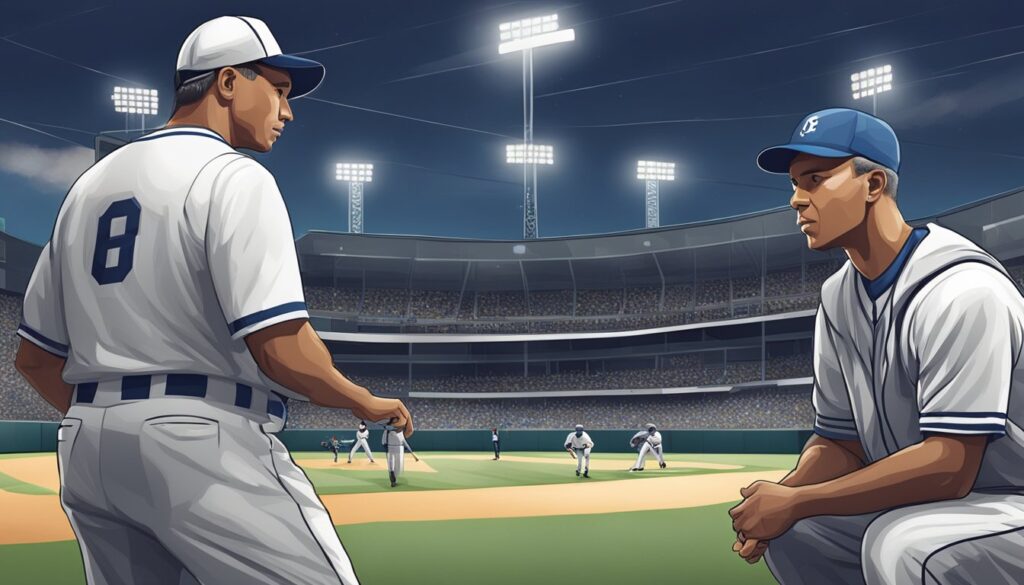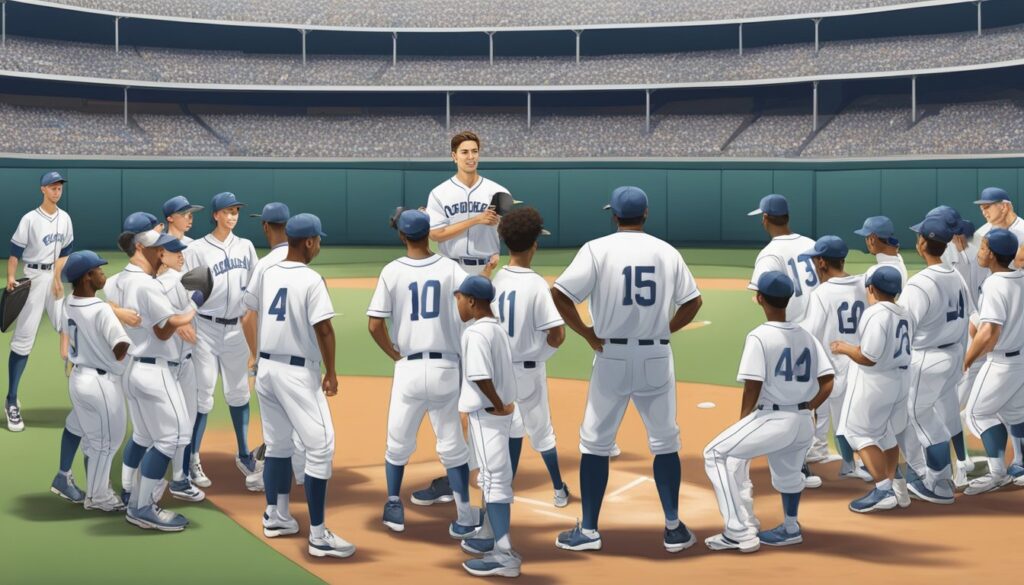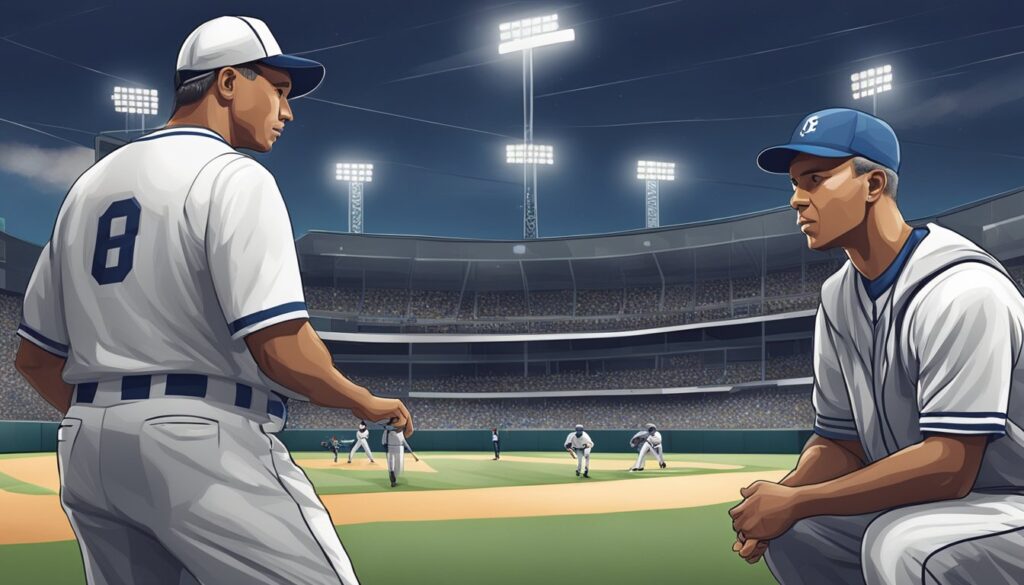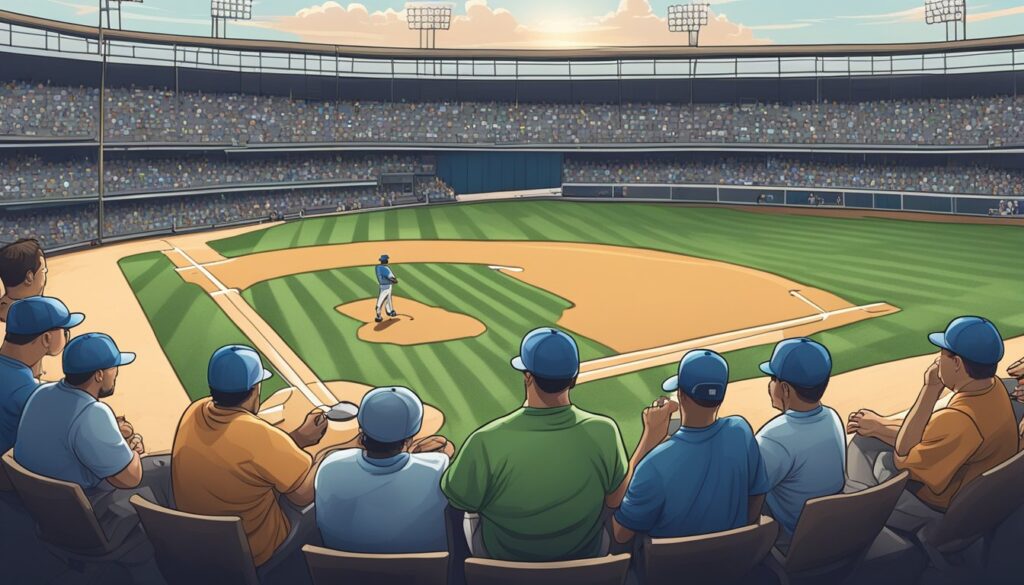100 Interview Questions for Selection in Baseball Team: Essential Insights for Players

Trying to make the perfect team for baseball? Choosing the right players is important and determines how successful the team is. By exploring 100 interview questions, you can uncover key insights about each player, setting the stage for a well-rounded and competitive team.

You’ll find questions focusing on various aspects, such as skills, teamwork, and strategy, that you can use in interviews. Knowing what to ask helps you learn which players have the qualities needed to excel.
As you ask these questions, pay attention to how each potential team member answers. Their responses can tell you a lot about their experience, attitude, and readiness to contribute to the team.
Understanding the Baseball Game

Success in baseball requires more than physical talent. Strategic thinking is crucial. Analyzing baseball statistics helps you make smart decisions in games. Being familiar with the strategies used in the game can give you an edge. You need technical skills along with an understanding of the game’s finer points.
Strategic Thinking
Strategic thinking involves analyzing data and making informed choices. You look at baseball statistics to understand player strengths and weaknesses.
This helps in setting lineups and making in-game decisions. Technical skills, like pitching and batting, are essential, but understanding when to apply them is key.
Successful teams rely on data analysis to improve strategies. Understanding stats like batting average, on-base percentage, and run average (ERA) allows you to anticipate the opponent’s moves. Developing this skill can significantly impact your performance on the field.
Physical Fitness and Nutrition for Baseball Game

Maintaining strong physical fitness and proper nutrition is essential for baseball players. It’s crucial to focus on building endurance, boosting strength, and eating a balanced diet. These elements are key in the daily routine of any athlete aiming for continuous improvement.
Endurance and Stamina
Building endurance and stamina is vital for baseball players. You need the energy to keep performing at your best throughout the game. Running drills, interval training, and consistent practice can help improve your endurance.
Incorporate aerobic exercises like jogging or cycling. These activities increase your lung capacity and help you manage longer games without tiring. Rest is essential. Adequate sleep allows your muscles to recover and build strength, contributing to long-lasting stamina.
Strength and Conditioning
Strength and conditioning play a significant role in a baseball player’s success. You should focus on both upper and lower body exercises. These include squats and other Exercises.
Strength training helps you hit harder and run faster. Conditioning workouts can enhance your flexibility and agility, key for defensive plays. Remember to follow a consistent regime. It supports muscle development and reduces the risk of injury.
Diet and Hydration
A well-balanced diet and proper hydration are crucial for peak performance. It’s important to consume carbohydrates for energy, protein for muscle repair, and healthy fats. Foods like fruits, and green vegetables are beneficial.
Stay hydrated by drinking plenty of water throughout the day. During games, consider electrolyte drinks to replace lost minerals. Proper nutrition doesn’t just fuel your game. It aids in recovery and supports continuous improvement.
Psychological Preparedness for Baseball

Being prepared mentally is just as important as physical skills in baseball. You need mental toughness, strategies to handle pressure, and techniques for visualization and mindfulness. Working as a team is also crucial. All these elements help in developing strong mental agility and resilience.
Mental Toughness
Mental toughness is essential for baseball. It allows you to stay focused and resilient, no matter what happens in the game.
Building mental toughness begins with understanding your strengths and weaknesses. Self-awareness helps you recognize what you need to work on. Staying positive even when things aren’t going your way is key. Learning from mistakes instead of getting upset is also important.
Practice scenarios where you might feel stressed. This can help prepare you for the real thing. Regular mental exercises can build mental fortitude.
It’s about training your mind like you train your body. This makes your mental game stronger every day.
Handling High-Pressure Situations
Playing baseball means dealing with intense pressure. To perform well, you need strategies to handle high-stakes moments.
Start by taking deep breaths when you feel overwhelmed. This helps calm your mind and body. Focus on the task at hand, not on what might go wrong. Create a routine before high-pressure moments. This could be a simple ritual like adjusting your cap or taking a deep breath. It prepares you mentally for the challenge.
Practice makes perfect. Try to simulate high-pressure situations during practice so you know how to handle them in real games. This builds both mental agility and resilience.
Visualisation and Mindfulness
Visualization exercises and mindfulness practices are powerful tools for improving performance. By imagining success in your mind, you set yourself up for achieving it in real life.
Spend a few minutes each day visualizing your performance. Picture details like your stance, the field, and the crowd. The more vivid, the better. This strengthens your mental imagery skills.
Mindfulness practices involve staying in the present moment. Practice being aware of your thoughts without judgment. This helps clear your mind, keeping you focused and less stressed.
Techniques such as breathing exercises or even short moments of reflection can improve concentration and composure on the field.
Collaborative Teamwork
Baseball is a team sport. You need strong collaborative teamwork skills to succeed. Teamwork means working together towards a common goal.
Communication is key. Talk with your teammates both on and off the field. Share your thoughts and listen to others. This builds trust and camaraderie.
Be supportive of each other. Celebrate successes and learn from failures as a group. This builds a solid team culture where everyone feels respected and valued. Through teamwork, you create an environment where everyone can perform at their best. By working together, you strengthen not only your team but also your own mental preparedness.
List of 100 Interview Questions for Selection in Baseball Team

- How do you prioritize tasks during a busy game day?
By using a checklist and focusing on urgent tasks first, you ensure everything runs smoothly. - Describe a time when you had to handle multiple responsibilities at once.
You managed ticket sales and assisted in fan experiences, ensuring both areas ran efficiently. - What steps do you take to stay organized at work?
You keep a planner and use digital tools to track tasks and deadlines. - How would you handle a dissatisfied fan?
Listening carefully, empathizing, and offering solutions help resolve the issue. - Describe your experience with sports broadcasting.
You’ve assisted in setting up equipment and ensuring broadcasts are smooth. - How do you prepare for an interview with a coach or player?
By researching their background and current performance to ask informed questions. - What skills do you bring to a professional baseball organization?
Your strengths are communication and multitasking in high-pressure situations. - Explain how you manage stress on a busy game day.
Taking short breaks and staying focused on the task at hand. - How do you contribute to a positive fan experience?
Always being helpful and ensuring fans feel welcomed and engaged. - What is your understanding of teamwork?
It involves cooperation between all team members, on and off the field. - Have you used any software to manage tasks or projects?
Yes, tools like Trello or Asana to organize duties. - Why do you want to work with our sports organization?
You value the team’s commitment to excellence and want to contribute. - Share an instance where you improved a process at work.
Suggested a new method for ticket sales that boosted efficiency. - What motivates you to stay organized?
A desire for efficiency and achieving goals drives you. - How do you keep up with the latest in sports management?
Through industry journals and attending relevant seminars. - What actions do you take when faced with a deadline?
Prioritize tasks, break them into smaller steps, and focus on completion. - How do you approach learning new tools like machine learning?
You start with tutorials and practical applications to understand their use. - Tell me about a time you solved a problem creatively.
Developed a simplified ticketing process using existing resources. - Have you ever worked on a team project? Describe your role.
Yes, as a coordinator ensuring everyone had what they needed to succeed. - What would you do if a coworker wasn’t pulling their weight?
Talk to them to understand and offer help. - How do you handle criticism at work?
View it as constructive and use it to improve your performance. - What are your favorite aspects of working in a sports organization?
The dynamic environment and passion shared by colleagues and fans. - Explain your decision-making process.
Gather information, weigh options, and make an informed choice. - Why do you believe teamwork is important for MLB teams?
Success relies on everyone working together efficiently and effectively. - Describe a time you had to learn something quickly.
You familiarized yourself with a new CRM before the start of the season. - How do you handle a difficult situation with a team member?
- What is your experience with organizing large events?
- How do you stay motivated during long season periods?
- What is your approach to setting and achieving goals?
- How would you handle a sudden change during a live broadcast?
- Can you give an example of your communication skills?
- How do you ensure accuracy in your work?
- What role have you played in increasing ticket sales?
- Describe your ability to adapt to new situations.
- How do you ensure customer satisfaction?
- What interests you about machine learning in sports?
- How do you prepare for organizational changes?
- Can you multitask efficiently in high-pressure environments?
- What strategies do you use to meet tight deadlines?
- Explain how you balance teamwork and individual tasks.
- How would you describe your work ethic?
- What makes you a good fit for our team?
- How do you handle repetitive tasks in your role?
- What is your experience with professional development?
- How do you evaluate your performance at work?
- How do you gather and use feedback effectively?
- Give an example of a successful team project you led.
- Describe your interest in sports analytics.
- How do you stay current with baseball trends and news?
- Why do you value diversity in the workplace?
- Explain your interest in fan engagement strategies.
- How do you handle disagreements at work?
- What are your strengths in problem-solving?
- How do organizational skills affect your productivity?
- Describe how you drive innovation in your team.
- Explain how you manage risk when planning events.
- What tactics do you use to boost team morale?
- Describe your experience with ticketing systems.
- How has multitasking improved your performance?
- Discuss a challenge you overcame in a previous role.
- How do you build and maintain relationships with clients?
- What drives you to achieve excellence?
- Explain your approach to learning from mistakes.
- How do you collaborate effectively with others?
- Why is time management crucial in sports broadcasting?
- Describe your approach to strategic planning.
- How do you prioritize tasks when everything seems urgent?
- What experience do you have with community outreach?
- Explain how you handle confidential information.
- Describe your role in enhancing fan experiences.
- How do you ensure safety during large events?
- Explain how you manage unexpected challenges.
- How do you leverage technology for productivity?
- Describe a situation where you had to be flexible.
- What is your method for tracking project progress?
- How do you balance creativity and practicality in your work?
- Explain your experience working with MLB teams.
- How do you stay focused when tasks are tedious?
- How do you approach conflict resolution among team members?
- Explain how you use data to inform decisions.
- What role does communication play in your job?
- How do you engage with fans to create lasting memories?
- Describe your leadership skills in action.
- How do you align your work with the organization’s goals?
- Explain your interest in sports business operations.
- How does your role impact overall team success?
- What are the keys to effective project management?
- How do you ensure your work supports organizational growth?
- Describe your experience with fundraising events.
- How do you approach continuous improvement?
- Explain how you develop your professional skills.
- What strategies do you use to overcome obstacles?
- How do you foster a culture of collaboration?
- Describe your experience with digital marketing in sports.
- How do you build trust with your team?
- Why is adaptability important in your role?
- Explain your role in enhancing ticket sales.
- How do you tailor fan experiences to different audiences?
- What are your methods for handling stress effectively?
- Describe how you prepare for busy game days.
10 Valuable Tips for Baseball Players
Here are ten valuable tips for baseball players looking to improve their game:
- Focus on Fundamentals: Master the basic skills such as hitting, throwing, catching, and base running. Consistent practice of these fundamentals is crucial.
- Stay Mentally Prepared: Baseball is as much a mental game as it is physical. Develop a strong mental approach by visualizing success and staying positive, even during tough moments.
- Work on Conditioning: Maintain a good level of physical fitness. Incorporate strength training, agility drills, and cardiovascular workouts to enhance your overall performance.
- Practice Situational Awareness: Understand the game situations and know what to do in different scenarios. This includes knowing when to steal a base, when to sacrifice, and how to position yourself defensively.
- Improve Your Hitting Mechanics: Focus on your stance, grip, and swing. Work with a coach or use video analysis to identify areas for improvement.
- Communicate with Teammates: Effective communication on the field can prevent mistakes. Always call for the ball and be aware of your teammates’ positions.
- Study the Game: Watch games, analyze players, and learn from their techniques and strategies. Understanding the game from a tactical perspective can give you an edge.
- Set Goals: Establish short-term and long-term goals for your development. This could include improving your batting average, increasing your speed, or mastering a new pitch.
- Stay Flexible and Adaptable: Be open to feedback and willing to adjust your techniques. Flexibility in your approach can help you overcome challenges and improve your skills.
- Have Fun and Enjoy the Game: Remember why you started playing baseball in the first place. Keeping a positive attitude and enjoying the game will enhance your performance and keep you motivated.
By incorporating these tips into your training and gameplay, you can enhance your skills and enjoyment of baseball.
Frequently Asked Questions

Skills, strategies, mental preparation, overcoming challenges, teamwork, and excellence are important in baseball. Here are answers to common questions about these topics to help you better understand what is needed to succeed.
What skills and attributes do you consider essential for a baseball team player?
You need strong hand-eye coordination and agility. Good communication is key for team dynamics. Mental toughness is crucial to handle pressure and improve continuously.
What strategies do you use to maintain focus and performance during a game?
Staying present in the moment helps. You might use routines to calm nerves and maintain concentration. Deep breathing or focusing techniques can keep you steady under pressure.
How do you prepare mentally and physically for a baseball season?
Regular practice and exercise are vital. You should balance workouts with rest. Mental readiness involves setting goals and visualizing game scenarios.
Can you describe a time when you overcame a challenge on the field?
Think about a game where you felt under pressure but pushed through. It might involve changing strategies mid-game or supporting a teammate. How you responded can be a testament to your resilience.
How do you work with coaches and teammates to develop and execute game plans?
Communication is essential. Discussing strategies openly with your team helps ensure everyone is on the same page. Flexibility is also important when adapting to different situations during a game.
What do you believe sets a great baseball player apart from a good one?
Dedication to improvement is crucial. Great players often have strong work ethics and never stop honing their skills. They also tend to excel at teamwork and elevate those around them.
All the Best !






